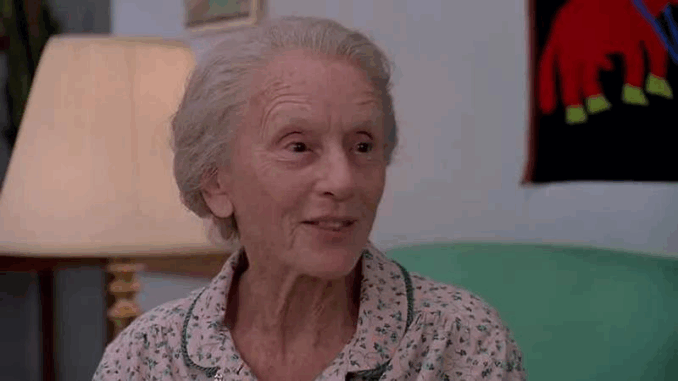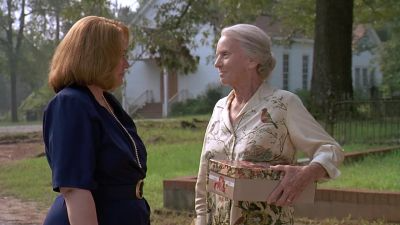
The Keeper of Memories and the Bridge Between Generations
In Fried Green Tomatoes, the past and present interweave through one unforgettable character—Ninny Threadgoode. Elderly, seemingly whimsical, and full of Southern charm, Ninny serves not only as the narrator but as the emotional bridge connecting the modern world with the spirited legacy of Whistle Stop, Alabama. While her tales captivate Evelyn Couch and viewers alike, Ninny herself emerges as much more than just a kindly old woman with a good memory. She’s the embodiment of history, identity, and quiet rebellion.
Through her words, she revives a world that time forgot—a place filled with courage, heartbreak, laughter, and radical love. But who is Ninny really? And what makes her such a vital heart of this story?
The Role of the Storyteller: More Than Just Anecdotes
Ninny’s role in Fried Green Tomatoes is deceptively simple. At first glance, she appears to be a sweet but chatty elderly woman in a nursing home, eager for company and prone to nostalgic storytelling. But as the film progresses, it becomes clear that she’s the soul of the narrative. Her tales of Idgie, Ruth, and the Whistle Stop Café aren’t just entertainment—they are history. They are a testament to a life lived fully, and to people who dared to live authentically when the world told them not to.
Through her storytelling, Ninny becomes a transformative presence for Evelyn Couch. A meek and self-conscious housewife, Evelyn finds courage, humor, and confidence through Ninny’s stories. The two women form a bond that crosses generations, social roles, and emotional landscapes.
Ninny is a guide—not just to Evelyn, but to the audience. Her stories are stitched with layers of meaning, evoking themes of feminism, aging, resilience, community, and self-rediscovery.
Was Ninny Really Idgie? The Beautiful Mystery
One of the film’s most enduring questions is whether Ninny and Idgie are, in fact, the same person. Though the movie never confirms this explicitly, many viewers speculate that Ninny is Idgie in disguise—an older woman protecting her past while sharing its lessons with someone who needs them.
Clues suggest this might be true: Ninny seems to know far more about Idgie’s inner life than anyone else would. She recounts Idgie’s emotions, thoughts, and private moments with uncanny clarity. She also mysteriously claims at the end of the film that she has no home to return to—only for Evelyn to find her tending a garden at the Threadgoode house.
But ambiguity is part of Ninny’s magic. Whether or not she is Idgie, she represents her spirit. She carries forward the bravery, defiance, and love that defined the Whistle Stop years. She is both memory and myth, reality and legend.
Ninny and Evelyn: A Life-Changing Friendship

The relationship between Ninny and Evelyn forms the emotional anchor of the film’s modern-day storyline. When they first meet, Evelyn is timid, insecure, and deeply unhappy in her personal life. Trapped in a conventional marriage and constantly dismissed, she feels invisible. Ninny’s stories serve as a balm, but also a call to arms.
Each tale emboldens Evelyn—encouraging her to stand up for herself, claim her desires, and shed societal expectations. Ninny doesn’t preach or offer advice. She simply tells, letting the lives of Idgie and Ruth serve as inspiration. By the end of the film, Evelyn has transformed from a woman afraid of her own voice into someone ready to start over.
Ninny’s friendship teaches us the power of listening, of cross-generational connection, and of mentorship rooted in love rather than authority.
The Realities of Aging: Dignity, Memory, and Legacy
In many ways, Ninny’s presence at the nursing home is a quiet commentary on how society often marginalizes the elderly. Forgotten by family, stripped of independence, and reduced to routine, many seniors find themselves lonely and disconnected. Ninny, however, refuses to fade into the background. Her voice remains strong—her memory vivid, her spirit unbroken.
She uses her stories not just to entertain but to preserve. Ninny understands that memory is a form of resistance, especially when it captures lives that defied norms and pushed boundaries. Through her recollections, the legacies of Idgie, Ruth, and the Whistle Stop community live on.
She’s also a reminder that aging does not mean irrelevance. Ninny is as essential to the film’s impact as any younger character. Her presence calls on society to re-evaluate how we treat the elderly—not as relics, but as repositories of wisdom and experience.
Imagining Ninny Threadgoode Today
If we were to imagine Ninny alive in the present day—perhaps in her early 100s—she would likely still be telling stories. Perhaps she’d have a podcast or a YouTube channel with thousands of followers tuning in for her Southern tales. Maybe a university would invite her to speak on oral history and women’s lives in the 20th century.
Ninny might live in a cozy house filled with scrapbooks, plants, and cats, still baking pies and gardening in her spare time. She could volunteer at a local library, hosting storytelling sessions for children and teenagers. Or she might be writing a memoir at last—one that finally reveals whether she was Idgie all along.
What’s certain is that she would still be teaching others how to find strength through story.
Jessica Tandy’s Portrayal: Bringing Ninny to Life
The brilliance of Ninny Threadgoode owes much to the legendary Jessica Tandy, who brought grace, nuance, and quiet power to the role. Already an Oscar winner for Driving Miss Daisy, Tandy infused Ninny with warmth, humor, and a sense of mystery that made her unforgettable.
Tandy’s performance captures the contradictions that make Ninny so compelling: she is fragile yet formidable, charming yet piercing, a teller of lighthearted anecdotes who carries the weight of generations in her voice.
It was one of Tandy’s final major film roles, and it served as a perfect capstone to a storied career. Her portrayal ensures that Ninny will continue to live on in the hearts of viewers worldwide.
Conclusion: A Woman Who Carried the Past Forward
Ninny Threadgoode is not just a character; she is a vessel. She carries memory, resilience, rebellion, and love through time and space. In a world that often rushes forward and forgets the wisdom of the past, Ninny stands as a reminder that stories matter—that who we were shapes who we are.
Through her, we come to know the world of Whistle Stop. Through her, Evelyn reclaims her life. And through her, we’re reminded that it’s never too late to bloom, to change, or to inspire others.
Ninny may have started as an old woman with a knack for storytelling, but by the end of Fried Green Tomatoes, she becomes something greater: a symbol of endurance, connection, and the transformative power of a well-told life.
